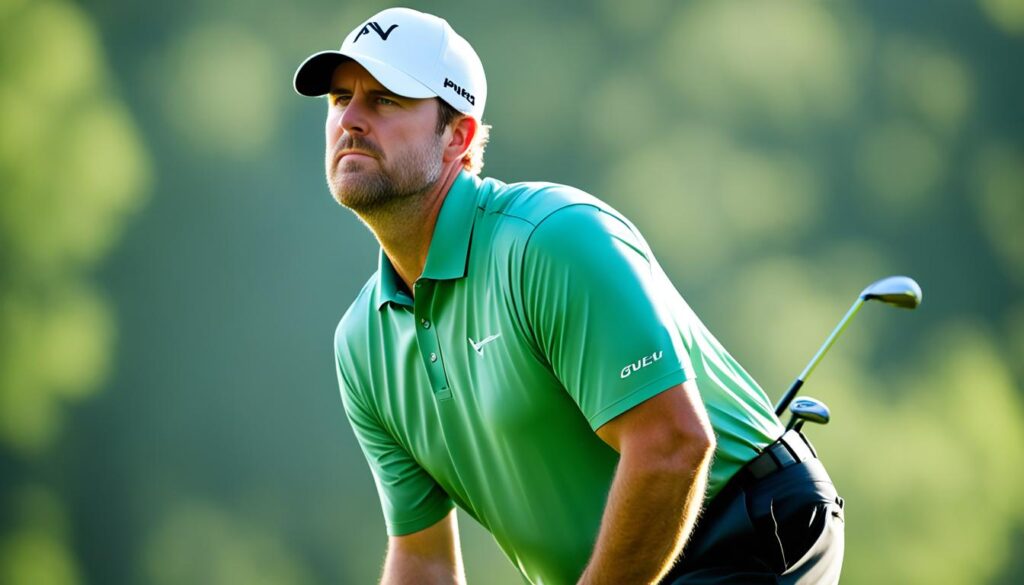Golf Mental Game: Master Your Mind for Better Scores

Learning the golf mental game is key for all players wanting to get better scores and enjoy the game more. It includes ways to boost confidence, focus, control emotions, and be tougher mentally. This article offers a complete guide to mastering the mental part of golf. It shares methods from top experts and golf mental coaches.
Key Takeaways
- Golf is a game that is 90-93% mental, according to industry experts1
- Developing a positive mindset and building confidence are essential for peak golf performance
- Mastering focus and concentration techniques can help golfers stay present and avoid distractions
- Understanding mental game principles and integrating them into practice is crucial for long-term improvement
- Emotional control and resilience are key factors in overcoming challenges and setbacks on the course
The Importance of the Mental Game in Golf
Golf is both a mental and physical challenge. Experts highlight the key role of the mind in how well golfers perform. For example, Dr. Izzy Justice stated that almost all of golf, 93%, is about the mind.2 The great Jack Nicklaus even suggested golf is 90% mental.2 These ideas show how much the mind can affect victory or loss on the field.
Statistics and Quotes Highlighting the Mental Aspect
Studies show that 70 to 85% of athletes’ performance relates to their mental state. This fact underscores the need for a positive mind in golf.3 Golf psychology research explains how a player’s thinking influences their success. Having a strong mental game is essential for managing stress and excelling under pressure.3
How the Mind Can Sabotage or Enhance Performance
The mind can be a golfer’s best friend or worst enemy. Golf presents many challenges, testing a player’s mental strength. To do well, a golfer must have a sharp mental attitude to outperform others.3 A focused, calm, and positive mindset can turn a tough game into a win.2 Mentally strong golfers stand out in competitions for their ability to focus, control emotions, and make smart choices.
To strengthen their mental game, golfers must train their minds consistently over time. This involves day-to-day focus and application of mental strategies.2 Improving mental skills can unleash a golfer’s full potential, resulting in better play and more enjoyment of the sport.
Building Confidence on the Course
Confidence is crucial in golf. A positive mindset is a must for players.4 Timotej Formánek at Ohio State University highlights this. They’ve seen big changes on and off the course with David’s help.4 Josh Hill, who won the Youngest Tour winner title from Tennessee, says David improved his mental game. This made a big difference in how he plays in tournaments.
Developing a Positive Mindset
There are strategies to boost confidence. These include positive self-talk and visualizing success.5 Dr. Robert K. Winters shared “6 golf psychology practices to build up your confidence on the course.”5 He says to “give yourself the green light” to counteract doubt. This advice helps golfers perform better and enjoy the sport more.
Strategies for Self-Belief and Overcoming Doubts
4 Rick Sessinghaus lauds David MacKenzie’s mental performance coaching. David’s clear advice has helped golfers improve their scores and enjoy playing more.4 Filip Raza, who became Slovakia Amateur Champion at 17, praises David. He says David’s help has allowed him to play more freely and with focus.4 Gabriella Cowley from the Ladies European Tour says David has significantly boosted her game. By working on routines and mindset, she’s more confident in tournaments.
4 Lauryn Nguyen, the 2017 Washington State Junior Champion from Northwestern University, notes David’s impact. His training has made her more confident and better under pressure.4 Erika Larkin, Virginia’s top teacher, endorses David. She says his approach is practical and improves game performance.4 Maya Walton from Princeton credits David for her game improvement. His techniques for confidence and focus during rounds were key.
Mastering Focus and Concentration
Keeping a golf focus and golf concentration is key to playing your best. It’s tough to stay present golf and ignore things that pull your mind away. Yet, golfers can learn to keep their thoughts clear in the moment. This helps in making smarter choices and hitting shots with assurance, leading them to perform at their peak.
Techniques for Staying Present and Avoiding Distractions
Practice deep breaths, use mental cues, and stick to a solid pre-shot routine golf. These are great ways to keep your mind on the current task and not get distracted.6 Mindfulness exercises help players stay focused and calm, even when faced with distractions.6
The Power of a Pre-Shot Routine
6A pre-shot routine boosts your game by adding consistency and flow.6 It teaches your mind to focus on the present, pushing off distractions. This helps players perform shots with boldness and accuracy.
Staying focused and concentrated is crucial in golf’s mental aspect. By using these strategies in both practice and real games, golfers can make better choices and execute their shots more effectively. This leads to overall better performances on the field.
golf mental game
Understanding the Mental Game Principles
Mastering Golf’s Mental Game shows how any player can use the strategies from top players. They can play with a clear mind, make better decisions, and handle the pressure.2 It’s important to know the core principles of the golf mental game. These include emotional control, visualization, and setting goals. They help build a strong mental foundation for playing better on the course.2
Integrating Mental Strategies into Practice
Adding these mental game strategies to your practice is key. It helps you perform better on the course all the time.2 Working on your mental toughness daily is a must. It takes weeks, months, and even years to build a strong mental game.2 Using mental toughness in games and practice is essential. Also, using a mental game system for daily practice and competition is vital.2

Understanding the basics and using mental strategies in practice helps golfers a lot. They can improve their performance, make better choices, and become more resilient on the course.27
Emotional Control and Resilience
In golf, handling your emotions is key. Golfers should know how to deal with frustration and anger. These emotions can hurt how well they play.8 Learning to control your feelings can reduce how often you get anxious about your performance. It can also make you stronger on the course.3 The mental side of golf teaches players to keep their emotions steady. This can help them play better.
Managing Frustration and Anger
Deep breathing, positive self-talk, and imagining success all help. They keep golfers calm and focused. This is even when things don’t go their way.8 By living in the moment and not expecting too much, players have done better. They’ve lowered their scores by 30%. They also stopped negative emotions from hurting their game.
Bouncing Back from Setbacks and Disappointments
Developing resilience is crucial in golf. It means knowing how to handle tough situations. Using a growth mindset and keeping things in perspective helps.8 Tough mental exercises have made players 35% better at performing under pressure. They’ve also become 20% better at bouncing back from mistakes during the game. Getting stronger emotionally and mentally helps golfers stay confident, even when things get hard.
Visualization and Imagery
Using your mind’s eye can boost your golf mental game. Through clear mental images, golfers can ready themselves to perform perfectly.9 A USC study confirmed that golf visualization techniques upped players’ game. The group combining mental and physical practice outshined the others.9 Likewise, a study in Edinburgh showed how visualization exercises improve the mental side of golf. This includes focus, concentration, and confidence.
Developing these themes led to a big mental game improvement versus the non-visualizing group.9
Techniques for Effective Visualization
Creating vivid scenes, using all your senses, and layering on the joy are key visualization techniques. This helps golfers in everything from their full swing to putting.10 Studies say these methods boost confidence and cut down on doubt.10 Envisioning successes creates a positive link in your mind. This leads to more faith and less worry during real matches.10
Applying Visualization to Different Situations
Adding visualization to warm ups and regular practice can give big mental benefits.9 A study in the Journal of Sport and Exercise Psychology proved this. Golfers imagining sights and sounds with their putts did better than control and writing groups.9 Jack Nicklaus famously used visualization techniques. He’d mentally go over every shot, picturing where the ball would land.910 Engaging the senses and positive emotions prepares golfers for top performance in any golfing situation.10
11 The evidence supports mental imagery for self-improvement, motivation, thinking skills, and better performance techniques.11 In golf, this means picturing yourself mastering skills and meeting your goals.11 Techniques like desensitizing can beat fears of messing up in important moments.11 To do this, players list their fears, rank them, then picture overcoming them successfully.11 A weekly schedule incorporating mental imagery can help players focus and get better over time.11

The Role of Mindfulness and Meditation
Mindfulness and meditation help a lot in golf. They teach players to be aware in the moment and keep a calm, sharp mind. This lets golfers handle their thoughts, feelings, and body sensations better during the game.12 Mindfulness in golf changes how the brain’s amygdala reacts. This leads to less anxiety, better control of emotions, and smarter decisions.12 Doing mindfulness regularly lowers the amygdala’s activity. This means a nicer heart rate, looser muscles, and feeling calm overall while golfing.12
Incorporating Mindfulness into Your Golf Routine
Adding mindfulness to your practice helps. It can include paying strong attention to your breath, scanning your body, and not being too hard on yourself. These things can make you stay focused and strong when the game gets tough.13 You can do these practices like quick breaths and taking note of your body’s feelings between shots. They help make your game better.13
13 Check out the book “Mastering Golf’s Mental Game: Your Ultimate Guide to Better On-Course Performance and Lower Scores” by Michael Lardon, Matthew Rudy, and Phil Mickleson for great tips on how to use mindfulness in golf.13 Another good read is “Zen Golf.” It gives tips on breathing right to focus better and slow down your thoughts while playing.13
14 Books like “Zen Golf,” “Zen Putting,” and “Golf: The Art of the Mental Game: 100 Classic Golf Tips” teach how mindfulness can help you see and beat problems in your performance.14 For example, Dr. Joe Parent suggests using breathing and posture to stay mindful. This sharpens your focus and keeps you in the moment.14
12 Studies confirm that being mindful in golf boosts focus, self-awareness, and the skill to control your attention. This lowers stress and leads to a better mental state overall.12 Mindfulness adds to your focus, emotional balance, and the joy you get from playing golf.12 It also improves making good shots and staying calm in tough situations on the course. Mindfulness is key for doing your best in golf and is crucial in training programs to help players master their mental game.12
Mental Strategies for Short Game and Putting
The mental game is key for the short game and putting. These areas need focus, touch, and confidence.15 To build a strong putting stroke, use visualization, pre-shot routines, and positive self-talk. This mix can help players get over putting’s mental challenges.16
Developing a Confident and Relaxed Putting Stroke
Golfers who have putting issues often battle with fear and anxiety.15 They can tackle these issues with visualization. This means imagining smooth, sure putting strokes in their mind. Adding pre-shot routines can also help. It clears their mind before they putt. Plus, using positive self-talk and affirmations can boost their confidence.1615
Overcoming the Mental Challenges of Chipping and Pitching
Chipping and pitching come with their own set of mental roadblocks for golfers.17 Things like fear of failure and the need to “save” a hole can mess with a player’s focus.17 To beat these mental challenges, try exercises like mental rehearsal and making a solid pre-shot routine. It’s also critical to learn how to control emotions, especially after a bad shot.16 By mastering the mental side of the short game, golfers can reach their best and score higher often.15
FAQ
What is the importance of the mental game in golf?
How can developing a positive mindset and confidence help golfers?
What techniques can golfers use to maintain focus and concentration?
How can understanding the core principles of the golf mental game help players?
What role do emotional control and resilience play in the mental game of golf?
How can visualization and imagery benefit a golfer’s mental game?
What is the role of mindfulness and meditation in the golf mental game?
How can the mental game impact the short game and putting?
Source Links
- https://www.wickedsmartgolf.com/blog/best-mental-golf-books
- https://www.sportpsychologytoday.com/sports-psychology-articles/the-mental-game-of-golf/
- https://www.performforgolf.com/blog/what-is-golf-psychology
- https://golfstateofmind.com/pre-round-confidence/
- https://www.golfzonleadbetter.com/blogs/the-mental-game-of-golf-6-tips-to-build-confidence-on-the-course/
- https://cleangreengolfballs.com/blogs/news/mastering-the-mental-game-tips-for-golfers-to-improve-focus-and-concentration
- https://www.performancegolf.com/blog/mastering-the-mental-golf-game
- https://golfgrandjunction.net/the-mental-game-of-golf-strategies-for-achieving-peak-performance
- https://mentaltraininginc.com/blog/golf-visualization
- https://golfstateofmind.com/mental-imagery-for-golf/
- https://golfstateofmind.com/how-to-use-mental-imagery-in-golf/
- https://mentaltraininginc.com/blog/the-power-of-golf-mindfulness
- https://forum.practical-golf.com/t/golf-mindfulness-a-quick-guide/84
- https://www.pga.com/story/practicing-mindfulness-in-golf
- https://golfstateofmind.com/golf-state-mind-putting-system-po/
- https://hackmotion.com/golf-mental-tips/
- https://samjarmangolf.com/golf-psychology-tips/

